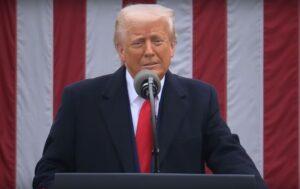Trump installs 10% baseline tariff, country-specific duties
The U.S. will implement a tariff of 10% on all imports with steeper reciprocal levies on trading partners including China and the European Union, President Donald Trump announced at the White House Wednesday in a move that the food industry warns will raise costs for manufacturers and consumers.

The U.S. will implement a tariff of 10% on all imports with steeper reciprocal levies on trading partners including China and the European Union, President Donald Trump announced at the White House Wednesday in a move that the food industry warns will raise costs for manufacturers and consumers.
The 10% tariff on all U.S. imports will go into effect April 5, while reciprocal tariffs on 60 countries will be implemented April 9.
Tom Madrecki, vice president of supply chain resiliency at the Consumer Brands Association, which represents consumer packaged goods manufacturers, immediately called on Trump to “fine-tune” his approach to tariffs and exempt key ingredients and inputs needed to protect manufacturing jobs and prevent “unnecessary inflation” at the grocery store.
“However well intended, the success of the President’s America First Trade Policy, must recognize the U.S. companies that are already doing it the right way but depend on imports for specific ingredients and inputs that cannot be sourced domestically,” Madrecki said in a statement. “Reciprocal tariffs that do not reflect ingredient and input availability concerns will inevitably raise costs, limit consumer access to affordable products and unintentionally harm iconic American manufacturers.”
Madrecki noted the consumer packaged goods industry already manufactures the majority of its products in the U.S. At the same time, some ingredients needed for some food and beverage products are not available domestically, or in the quantity needed. “No amount of tariffs will bring these inputs back to the U.S.,” he added.
Under the tariff announcement, the president said that certain trading partners such as China, Japan and the European Union will be subject to higher duties than the baseline rate, effective April 9. Those countries will face levies equal to half of a calculated total of trade barriers, including tariffs and value-added taxes, Trump said is imposed on the U.S. by each trading partner.
For example, the U.S. will charge China a 34% tariff based on a calculated 67% charge the country has placed on the U.S. through tariffs and other trade actions. Meanwhile, Japan will be charged 24%, the EU will be charged 20% and Vietnam will be charged 46%.
The reciprocal tariff rates will only apply to non-U.S. content of finished goods if at least 20% of the value of the product was made in the U.S., per an executive order Trump signed enacting the new duties. Previously enacted tariffs on Canada and Mexico will not be affected by the new tariffs, per a White House fact sheet. This includes the pause on duties for imported goods compliant with the United States-Mexico-Canada Agreement.
Goods such as steel, aluminum, cars, automotive parts, copper, pharmaceuticals and semiconductors are not subject to the new duties. Previously enacted tariffs on steel and aluminum, as well as those on cars and automotive parts, will remain in effect.
Related news
Coca-Cola To Discontinue Frozen Products In US And Canada
🎧 Hallgasd a cikket: Lejátszás Szünet Folytatás Leállítás Nyelv: Auto…
Read more >Power in craft beer
🎧 Hallgasd a cikket: Lejátszás Szünet Folytatás Leállítás Nyelv: Auto…
Read more >Related news
II. Green Gastronomy – Marketing Communication Workshop organized by the MMSZ HoReCa and Green Section
🎧 Hallgasd a cikket: Lejátszás Szünet Folytatás Leállítás Nyelv: Auto…
Read more >Retail sales of organic products in Hungary increased by 13.9% – our country is the second fastest growing market in the European Union
🎧 Hallgasd a cikket: Lejátszás Szünet Folytatás Leállítás Nyelv: Auto…
Read more >








